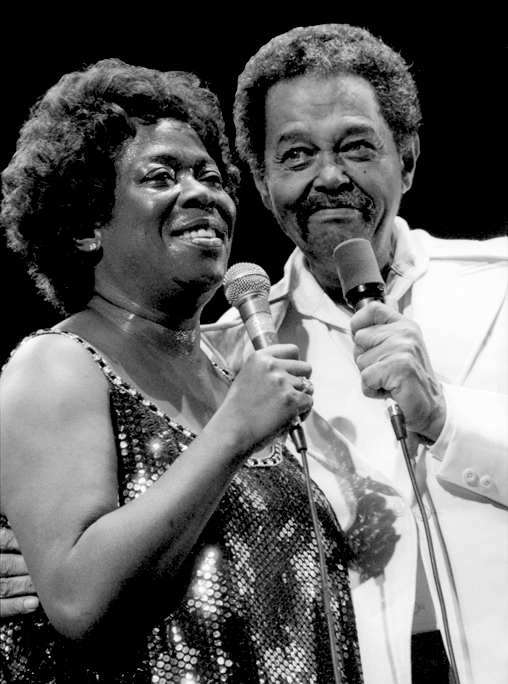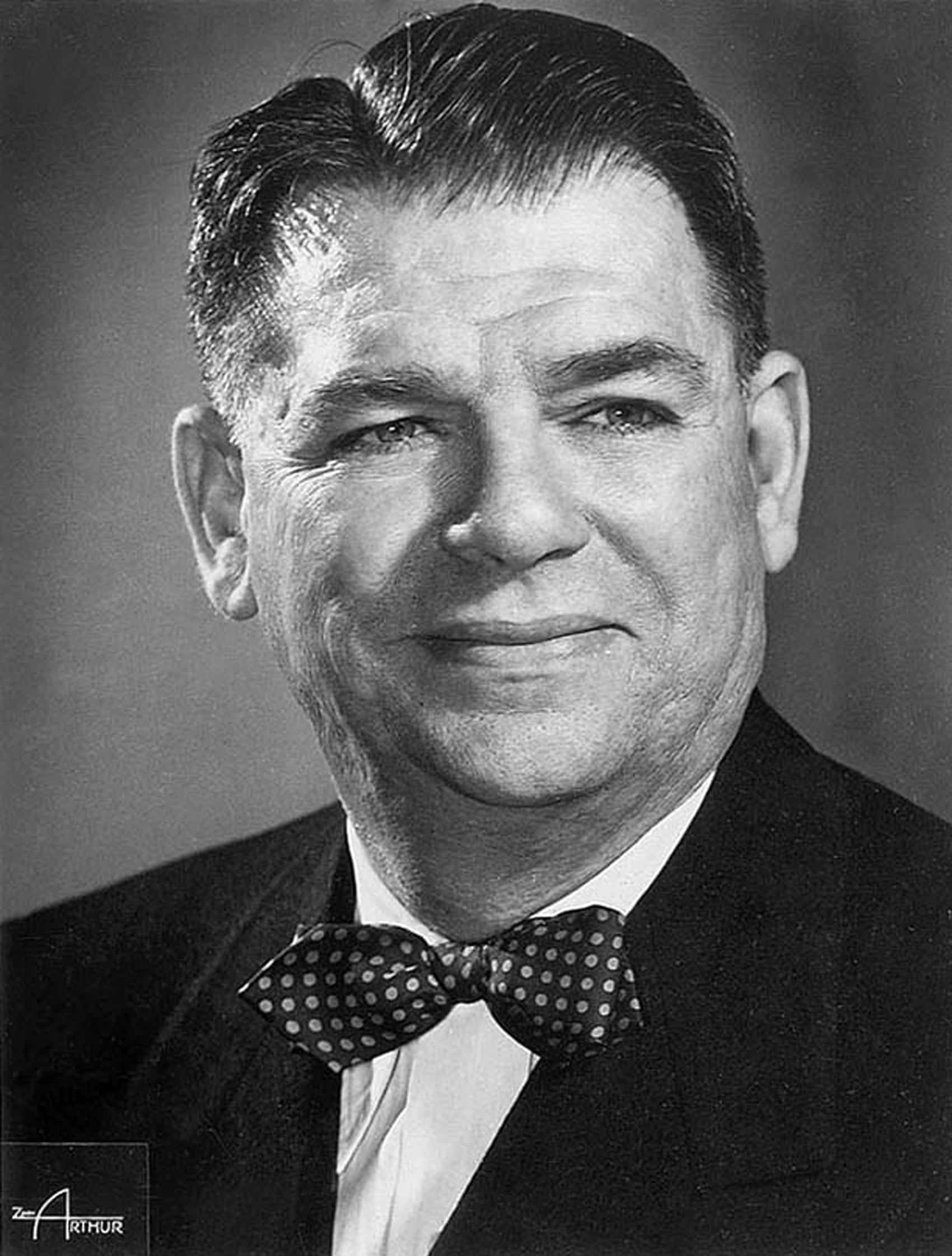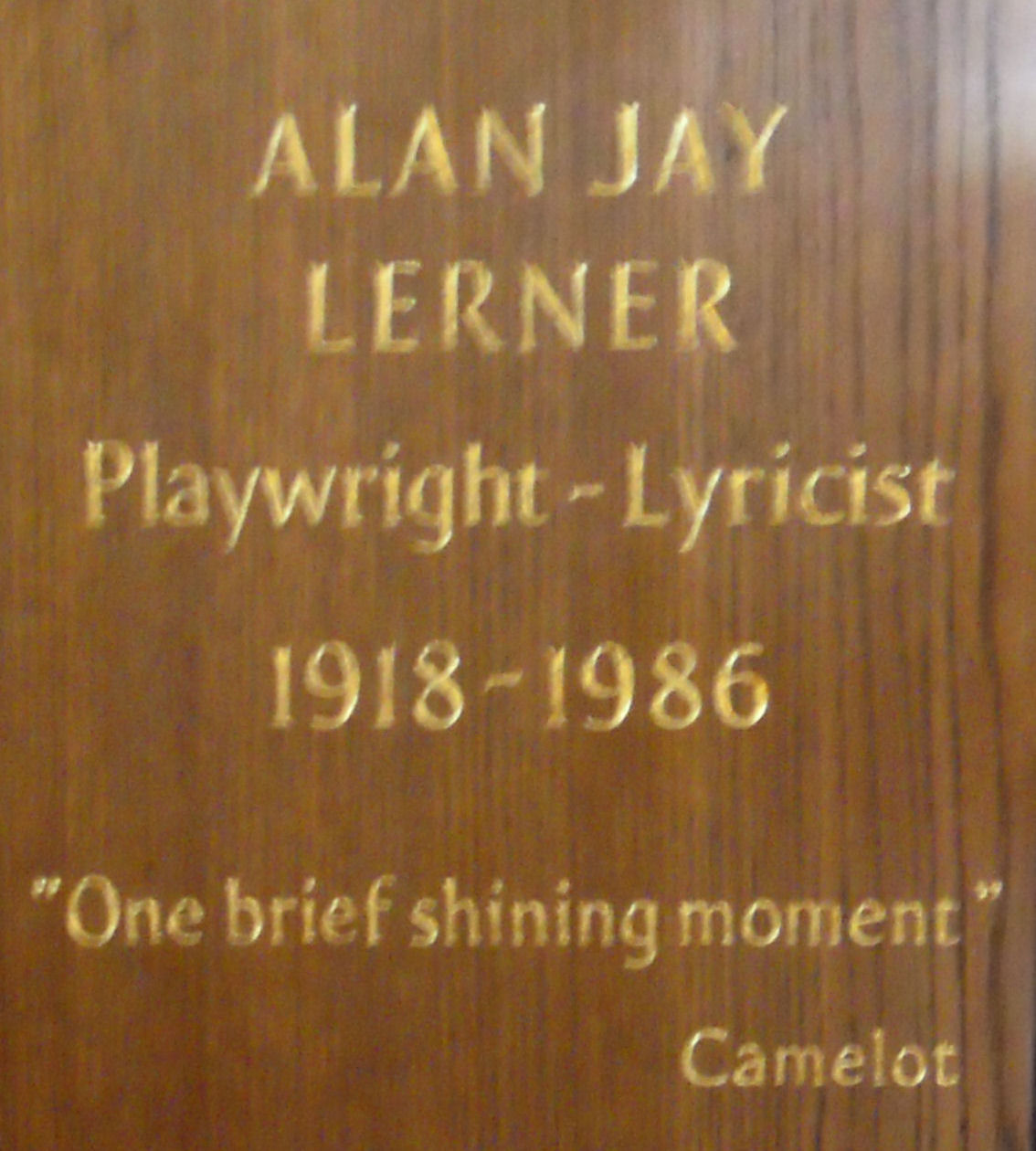|
Broadway, Bongos And Mr. B
''Broadway, Bongos and Mr. B'' is a 1961 studio album by the American singer Billy Eckstine. It was arranged by Hal Mooney, and marked Eckstine's return to Roulette Records. The album features Latin tinged arrangements of popular Broadway show tunes, with a percussion section of xylophones, marimbas and bongos. In their July 1961 review of ''Broadway, Bongos and Mr. B'', ''Billboard'' magazine wrote that "This is one of the best albums made by Billy Eckstine in many years", and that he was "singing with confidence again in his own style". The review concluded that it was "A strong new album that could help win back many of Mr. B's fans". This was the third of Eckstine's Mercury Records albums to use the same photograph of him. It had previously graced the covers of ''Billy's Best!'' (1958) and ''Billy Eckstine's Imagination'' (1958). Track listing # " From This Moment On" (Cole Porter) – 2:19 # "I Could Write a Book" (Richard Rodgers, Lorenz Hart) – 2:02 # " If Ever I W ... [...More Info...] [...Related Items...] OR: [Wikipedia] [Google] [Baidu] |
Billy Eckstine
William Clarence Eckstine (July 8, 1914 – March 8, 1993) was an American jazz and pop singer and a bandleader during the swing and bebop eras. He was noted for his rich, almost operatic bass-baritone voice. In 2019, Eckstine was posthumously awarded the Grammy Lifetime Achievement Award "for performers who, during their lifetimes, have made creative contributions of outstanding artistic significance to the field of recording." His recording of " I Apologize" (MGM, 1948) was given the Grammy Hall of Fame Award in 1999. ''The New York Times'' described him as an "influential band leader" whose "suave bass-baritone" and "full-throated, sugary approach to popular songs inspired singers like Earl Coleman, Johnny Hartman, Joe Williams, Arthur Prysock, and Lou Rawls." Early life and education Eckstine was born in Pittsburgh, Pennsylvania, United States, the son of William Eckstein, a chauffeur, and Charlotte Eckstein, a seamstress. Eckstine's paternal grandparents were William F. ... [...More Info...] [...Related Items...] OR: [Wikipedia] [Google] [Baidu] |
From This Moment On (Cole Porter Song)
"From This Moment On" is a 1950 popular song written by Cole Porter, which has since become a jazz standard. It was originally written for the 1950 musical '' Out of This World'', but director George Abbott dropped it from the musical before its Broadway premiere, possibly due to lackluster singing by cast member William Eythe. It was then included in MGM's 1953 film ''Kiss Me Kate'', an adaptation of Porter's stage musical ''Kiss Me, Kate'' when it was sung by Ann Miller, Tommy Rall, Bob Fosse and Bobby Van. In theatrical version of Kiss Me, Kate it goes now as the duet of general Harrison Howell and Lilli Vanessi (since 1999 revival). Many versions of the song have been recorded including those by: *Doris Day - a single release in 1950. * Les Brown - ''Live At The Hollywood Palladium'' (1953) *Anita O'Day - for her album ''An Evening with Anita O'Day'' (1955) *Ella Fitzgerald - for ''Ella Fitzgerald Sings the Cole Porter Song Book'' (1956) *Frank Sinatra - '' A Swingin' Affair ... [...More Info...] [...Related Items...] OR: [Wikipedia] [Google] [Baidu] |
Stephen Sondheim
Stephen Joshua Sondheim (; March 22, 1930November 26, 2021) was an American composer and lyricist. One of the most important figures in twentieth-century musical theater, Sondheim is credited for having "reinvented the American musical" with shows that tackle "unexpected themes that range far beyond the enre'straditional subjects" with "music and lyrics of unprecedented complexity and sophistication." His shows address "darker, more harrowing elements of the human experience," with songs often tinged with "ambivalence" about various aspects of life. He was known for his frequent collaborations with Hal Prince and James Lapine on the Broadway stage. Sondheim's interest in musical theater began at a young age, and he was mentored by Oscar Hammerstein II. He began his career by writing the lyrics for ''West Side Story'' (1957) and ''Gypsy'' (1959). He transitioned to writing both music and lyrics for the theater, with his best-known works including '' A Funny Thing Happened on the ... [...More Info...] [...Related Items...] OR: [Wikipedia] [Google] [Baidu] |
Leonard Bernstein
Leonard Bernstein ( ; August 25, 1918 – October 14, 1990) was an American conductor, composer, pianist, music educator, author, and humanitarian. Considered to be one of the most important conductors of his time, he was the first American conductor to receive international acclaim. According to music critic Donal Henahan, he was "one of the most prodigiously talented and successful musicians in American history". Bernstein was the recipient of many honors, including seven Emmy Awards, two Tony Awards, sixteen Grammy Awards including the Lifetime Achievement Award, and the Kennedy Center Honors, Kennedy Center Honor. As a composer he wrote in many genres, including symphonic and orchestral music, ballet, film and theatre music, choral works, opera, chamber music and works for the piano. His best-known work is the Broadway theatre, Broadway musical ''West Side Story'', which continues to be regularly performed worldwide, and has been adapted into two (West Side Story (1961 ... [...More Info...] [...Related Items...] OR: [Wikipedia] [Google] [Baidu] |
Tonight (1956 Song)
"Tonight" is a song from the 1957 musical ''West Side Story'' with music written by Leonard Bernstein and lyrics by Stephen Sondheim. It was published in 1956. Description The song is a love duet between the protagonists Tony and Maria, sung while Tony visits Maria on the fire escape outside her apartment. ''West Side Story'' is a modernized adaptation of Shakespeare's '' Romeo and Juliet'' set in 20th-century New York; the scene in which "Tonight" appears is the adaptation of ''Romeo and Juliets famous "balcony scene". History Originally the song for the balcony scene was to have been " One Hand, One Heart". It was felt that this song was too innocent for two teenagers in love, and so it was decided to take this tune, which hitherto only existed as the overarching phrase from the " Tonight Quintet" and use it as the tune for the balcony scene. In the original 1957 Broadway production of ''West Side Story'', "Tonight" was performed by Larry Kert and Carol Lawrence in the ... [...More Info...] [...Related Items...] OR: [Wikipedia] [Google] [Baidu] |
Oscar Hammerstein II
Oscar Greeley Clendenning Hammerstein II (; July 12, 1895 – August 23, 1960) was an American lyricist, librettist, theatrical producer, and (usually uncredited) director in the musical theater for almost 40 years. He won eight Tony Awards and two Academy Awards for Best Original Song. Many of his songs are standard repertoire for vocalists and jazz musicians. He co-wrote 850 songs. He is best known for his collaborations with composer Richard Rodgers, as the duo Rodgers and Hammerstein, whose musicals include ''Oklahoma!'', '' Carousel'', '' South Pacific'', ''The King and I'', and ''The Sound of Music''. Described by Stephen Sondheim as an "experimental playwright", Hammerstein helped bring the American musical to new maturity by popularizing musicals that focused on stories and character rather than the lighthearted entertainment that the musical had been known for beforehand. He also collaborated with Jerome Kern (with whom he wrote ''Show Boat''), Vincent Y ... [...More Info...] [...Related Items...] OR: [Wikipedia] [Google] [Baidu] |
Oh, What A Beautiful Mornin'
"Oh, What a Beautiful Mornin'" is the opening song from the musical ''Oklahoma!'', which premiered on Broadway in 1943. It was written by composer Richard Rodgers and lyricist/librettist Oscar Hammerstein II. The leading male character in ''Oklahoma!'', Curly McLain, sings the song at the beginning of the first scene of the musical. The refrain runs: "Oh, what a beautiful mornin'! / Oh, what a beautiful day! / I've got a beautiful feelin' / Ev'rythin's goin' my way." Curly's "brimming optimism is perfectly captured by Rodgers' ebullient music and Hammerstein's buoyant pastoral lyrics."Cummings, Robert"Richard Rodgers: Oh, What a Beautiful Mornin', song (for the musical ''Oklahoma!'')" Allmusic.com, May 10, 2014 This was the first song of Rodgers and Hammerstein's musical collaboration to be heard by theatre audiences. It has become one of their most famous numbers and "quickly became one of the most popular American songs to emerge from the wartime era, gaining currency away from ... [...More Info...] [...Related Items...] OR: [Wikipedia] [Google] [Baidu] |
I've Got You Under My Skin
"I've Got You Under My Skin" is a song written by American composer Cole Porter in 1936. It was introduced that year in the Eleanor Powell musical film ''Born to Dance'' in which it was performed by Virginia Bruce. It was nominated for the Academy Award for Best Original Song that year but lost out to The Way You Look Tonight. Popular recordings in 1936 were by Ray Noble and his Orchestra (vocal by Al Bowlly) and by Hal Kemp and his Orchestra (vocal by Skinnay Ennis). The song has subsequently been recorded by hundreds of artists. It became a signature song for Frank Sinatra, and, in 1966, became a top 10 hit for the Four Seasons. Charts Weekly charts Louis Prima and Keely Smith The Four Seasons Year-end charts The Four Seasons Versions by Frank Sinatra Sinatra first sang the song in 1946 on his weekly radio show, as the second part of a medley with "Easy to Love". He recorded a studio version of the song with Nelson Riddle orchestral arrangement, accompanied by ... [...More Info...] [...Related Items...] OR: [Wikipedia] [Google] [Baidu] |
Frederick Loewe
Frederick Loewe (, originally German Friedrich (Fritz) Löwe ; June 10, 1901 – February 14, 1988) was an Austrian-United States, American composer. He collaborated with lyricist Alan Jay Lerner on a series of Broadway musicals, including ''Brigadoon'', ''Paint Your Wagon (musical), Paint Your Wagon'', ''My Fair Lady'', and ''Camelot (musical), Camelot'', all of which were made into films, as well as the original film musical ''Gigi (1958 film), Gigi'' (1958), which was first Gigi (musical), transferred to the stage in 1973. Biography Loewe was born in Berlin (Charlottenburg), Germany, to Vienna, Viennese parents Edmund and Rosa Loewe. His father was a noted Jewish operetta star who performed throughout Europe and in North America, North and South America; he starred as Count Danilo in the 1906 Berlin production of ''The Merry Widow''. Loewe grew up in Berlin and attended a Prussian cadet school from the age of five until he was thirteen. At an early age Loewe learned to play ... [...More Info...] [...Related Items...] OR: [Wikipedia] [Google] [Baidu] |
Alan Jay Lerner
Alan Jay Lerner (August 31, 1918 – June 14, 1986) was an American lyricist and librettist. In collaboration with Frederick Loewe, and later Burton Lane, he created some of the world's most popular and enduring works of musical theatre both for the stage and on film. He won three Tony Awards and three Academy Awards, among other honors. Early life and education Born in New York City, he was the son of Edith Adelson Lerner and Joseph Jay Lerner, whose brother, Samuel Alexander Lerner, was founder and owner of the Lerner Stores, a chain of dress shops. One of Lerner's cousins was the radio comedian and television game show panelist Henry Morgan (comedian), Henry Morgan. Lerner was educated at Bedales School in England, Choate Rosemary Hall, The Choate School (now Choate Rosemary Hall) in Wallingford, Connecticut, (where he wrote "The Choate Marching Song") and Harvard University, Harvard. He attended both Camp Androscoggin and Camp Greylock. At both Choate and Harvard, Lerner ... [...More Info...] [...Related Items...] OR: [Wikipedia] [Google] [Baidu] |
Lorenz Hart
Lorenz Milton Hart (May 2, 1895 – November 22, 1943) was an American lyricist and half of the Broadway songwriting team Rodgers and Hart. Some of his more famous lyrics include " Blue Moon", " The Lady Is a Tramp", "Manhattan", "Bewitched, Bothered and Bewildered", and "My Funny Valentine". Life and career Hart was born in Harlem, New York City, the elder of two sons, to Jewish immigrant parents, Max M. and Frieda (Isenberg) Hart, of German background. Through his mother, he was a great-grandnephew of the German poet Heinrich Heine. His father, a business promoter, sent Hart and his brother to private schools. (His brother, Teddy Hart, also went into theatre and became a musical comedy star. Teddy Hart's wife, Dorothy Hart, wrote a biography of Lorenz Hart.) Hart received his early education from Columbia Grammar School and entered Columbia College in 1913, before switching to Columbia University School of Journalism, where he attended for two years. [...More Info...] [...Related Items...] OR: [Wikipedia] [Google] [Baidu] |




